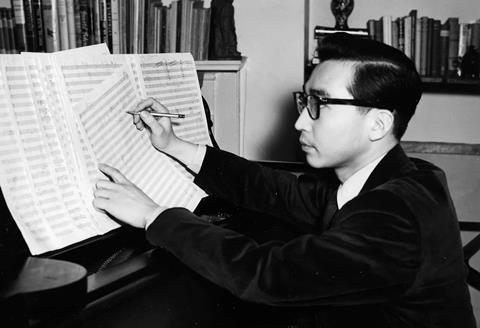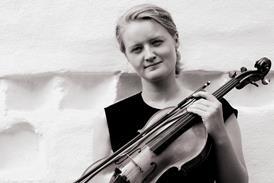Ahead of the Brentano Quartet’s New York premiere of Lei Liang’s Madrigal Mongolia at Caramoor, violinist Mark Steinberg reflects on the enduring influence of Chou Wen-chung — mentor, composer and artistic catalyst.

Discover more Featured Stories like this in The Strad Playing Hub
The Brentano Quartet returns to Caramoor on Sunday, 27 April, for the New York premiere of Madrigal Mongolia, a new work by Lei Liang commissioned as a tribute to the enormously influential composer, educator and cultural ambassador Chou Wen-chung, who emigrated from China to the US in 1949 and died in 2019 at age 96.
The piece was born from a gesture of generosity: following Chou’s passing in 2019, his family made a gift to the Brentano Quartet in recognition of their long artistic relationship. The quartet chose to honour that connection by inviting Lei Liang — a former student of Chou’s and a distinguished composer in his own right — to write a work that would embody his mentor’s spirit.
Lei Liang recalls his mentor once sharing ’these inspiring words about the cultural heritage of our home: “In calligraphy, every stroke has emotion. Here, lines become waves, and becomes textures”’.
Of Madrigal Mongolia, Lei Liang writes: ’I have loved this music since my childhood. One of my family’s closest friends, the renowned Mongolian scholar Wulalji, visited our home in Beijing frequently. With a sip of alcohol, he would start singing, sometimes continuing late into the night. These personal memories date to the years after the Cultural Revolution, when obnoxiously cheerful propaganda music flooded the airwaves. Yet it was these lonely long songs that evoked in me a deep sense of longing and awakening’.
Founded in 1992, the Brentano Quartet took its name from Antonie Brentano, whom many scholars consider to be Beethoven’s ’Immortal Beloved’, the intended recipient of his famous love confession. Over the years, the Brentanos have commissioned works from some of today’s most compelling composers, including Vijay Iyer, Gabriela Frank, Matthew Aucoin and Steven Mackey, among others.
Lei Liang, a Pulitzer Prize finalist and recipient of the prestigious Grawemeyer Award in 2020, brings a unique compositional voice shaped by both Western training and deep engagement with Asian musical traditions. In Madrigal Mongolia, that dual heritage finds powerful expression — echoing Chou Wen-chung’s own lifelong exploration of cultural dialogue through sound. The Caramoor programme will juxtapose Madrigal Mongolia with Haydn’s String Quartet in D Major, H. III:42, and the String Quartet No. 3 in B-flat Major, Op. 67, by Brahms.
Violinist Mark Steinberg shared his thoughts about Wen-chung and the collaboration with Lei Liang.
What was the Brentano Quartet’s relationship with Chou Wen-chung? How did he influence you?
Mark Steinberg: Chou Wen-chung was a beautiful man and a deep thinker, with a profound interest in the philosophical side of music and the expressive, revelatory possibilities of integrating classical traditions from East and West. Having studied with such seminal composers as Varèse and Martinu, he went on to teach for years at Columbia University, where he inspired an impressive number of brilliant young composers. He encouraged them to explore this fertile meeting point of rich traditions.
Chou wrote two string quartets, both for our group, and we had the good fortune not only to be entrusted with introducing these works to the world, but also to collaborate with him in shaping and refining them.
What stands out most to you about Chou’s legacy?
Mark Steinberg: Chou’s legacy lives both in his wonderful catalogue of works and in his thoughtful, sensitive engagement with music as a language — a means to explore ideas and imaginative possibilities. He both shrank and expanded our world, bringing varied traditions into conversation, and in doing so, opened a portal to a vital new amalgam with its own integrity and worldview.

How did this commission from Lei Liang come about?
Mark Steinberg: Our quartet was deeply touched and honoured to receive a gift from Chou’s family upon his passing — a gesture celebrating our long and cherished relationship with him. We felt that the most meaningful use of those funds would be to commission a new work dedicated to him, one that would embody the spirit with which he approached music.
Lei Liang had a long and close relationship with Chou, considering him a mentor and inspiration. We had worked with Lei before and love both him and his music, so it felt like a perfect tribute to invite him to write this piece. We were immensely grateful that he accepted — with enthusiasm and joy.
Does Lei Liang’s composition reflect Chou Wen-chung’s ideal of merging Eastern and Western musical traditions?
Mark Steinberg: Absolutely. Lei’s new work is rooted in Mongolian folk music, a tradition he grew up with and one that moves him deeply. In that sense, it flows directly from Chou’s wellspring — a merging of heritages and languages not as exoticism or effect, but as a newly discovered vernacular of the mind and heart.
What do you hope audiences will take away from this tribute?
Mark Steinberg: We don’t have a preset expectation for how audiences should respond. We only hope they arrive with open ears, open minds and open hearts. From that starting point, genuine communication becomes possible — a space where we can meet in emotional availability and receptivity. Culture takes on meaning when we’re willing to be vulnerable to the voices and visions of those around us.
The Brentano Quartet performs Lei Liang’s Madrigal Mongolia, along with music by Haydn and Brahms, on Sunday, 27 April, at Caramoor.
Read: Concert review: Brentano Quartet
Read: Postcard from Hong Kong: Musicus Fest
Read: ’Always a surprise in her writing’: Rediscovering French composer Fernande Decruck
Discover more Featured Stories like this in The Strad Playing Hub
The number one source for playing and teaching books, guides, CDs, calendars and back issues of the magazine.
In The Best of Technique you’ll discover the top playing tips of the world’s leading string players and teachers. It’s packed full of exercises for students, plus examples from the standard repertoire to show you how to integrate the technique into your playing.
The Strad’s Masterclass series brings together the finest string players with some of the greatest string works ever written. Always one of our most popular sections, Masterclass has been an invaluable aid to aspiring soloists, chamber musicians and string teachers since the 1990s.
The Canada Council of the Arts’ Musical Instrument Bank is 40 years old in 2025. This year’s calendar celebrates some its treasures, including four instruments by Antonio Stradivari and priceless works by Montagnana, Gagliano, Pressenda and David Tecchler.
Reference





































No comments yet